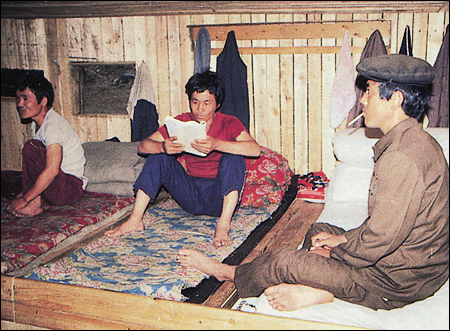
Russia more flexible than China on N. Korean defectors

North Korean loggers in Russia successfully arrived here earlier this month with help from the South Korean Embassy in Moscow. It shows the contrasting stance between Russia and China in dealing with the defectors from their neighbor.
According to government sources and comments made by Kim Hee-tae, head of a North Korean human rights religious group, eight North Koreans who fled from a logging camp in eastern Siberia, arrived here on April 11 and April 13.
It is said that there are still some 30 defectors in Moscow waiting to come to South Korea.
Since the 1950s, Pyongyang has sent loggers to eastern Siberia to earn hard currency. It is estimated that there are over 20,000 North Korean loggers working there.
Suffering cold weather, exploitation and surveillance from state-owned North Korean entities, they have started to flee the working site in search of freedom.
There have been numerous defection attempts by the loggers since being sent to work in Russia.
Experts believe if the workers are returned to North Korea, they will face harsh punishment and possibly execution. Fortunately, they were granted refugee status in Russia by the United Nations.
“Russia is relatively cooperative with the South Korean government in the North Korean defector issue,” said a foreign ministry official on condition of anonymity. “In Russia, the process of sending them to South Korea is well institutionalized based on standards given by the United Nations. Russia gives a substantial role to the United Nations High Commissioner for Refugees’ (UNHCR) Moscow office in dealing with the issue.”
In contrast, Beijing has been reluctant to take the same action, at least not on the surface.
Though the latest reports say China has temporally stopped repatriating North Korean defectors in the wake of Pyongyang’s rocket launch, it still considers them illegal economic migrants rather than refugees, which gives it the legitimacy to send them back.
The defector issue still remains a bone of contention between Seoul and Beijing.
“Russia, compared to China, has less chance of having a mass influx of refugees from North Korea crossing the border. Russia’s border with the North is much smaller than China’s,” said Ko Jae-nam, a Russia expert at the Korea National Diplomatic Academy.
“Another reason for Moscow’s flexibility comes from a difference in the level of bilateral ties,” added Ko. “Russia has already scrapped its military alliance with North Korea while China maintains it.”
In 2000, Russia replaced the mutual security treaty, which the former Soviet Union had signed, with the Treaty on Friendship, Good-Neighborly Relations and Cooperation. The latter does not include the controversial “immediate intervention” clause which requires either country to come to the aid of the other in the event of external aggression. Yet, Beijing’s military alliance treaty with Pyongyang, signed in 1961, remains intact. <Korea Times/Chung Min-uck>


